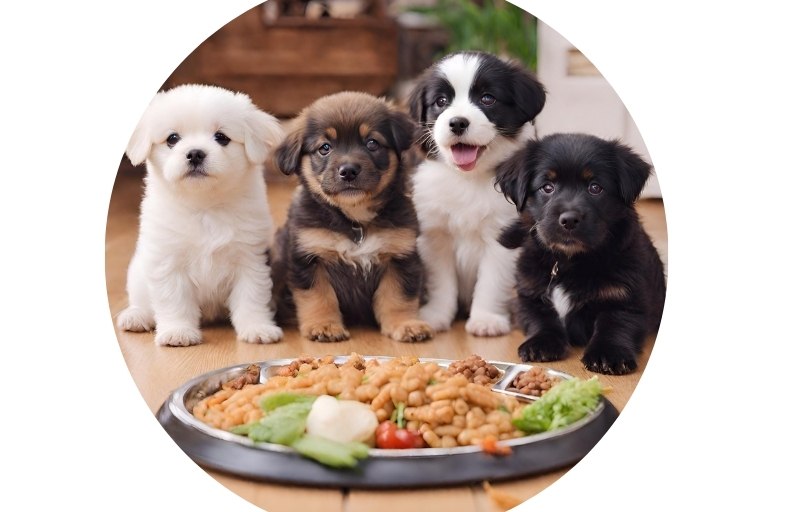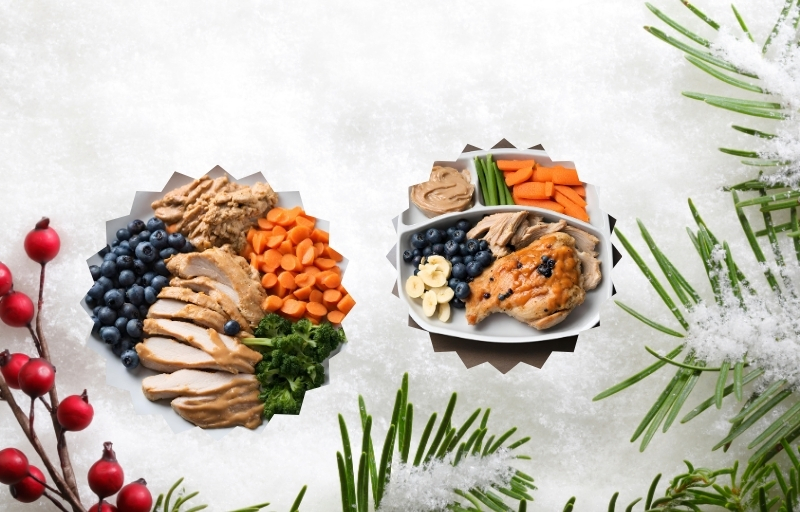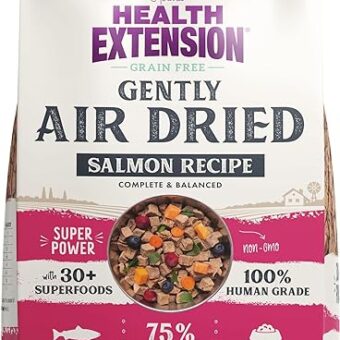Contents
- 1 Understanding the Basics of a Dog’s Diet
- 2 The Essential Nutrients Every Dog Needs in Their Daily Diet
- 3 Common Human Foods That Are Safe & Unsafe for Dogs to Consume
- 4 Different Types of Commercial Dog Food: Which One is Right for Your Furry Friend?
- 5 Catering to Special Dietary Needs: How to Handle Allergies and Food Sensitivities in Dogs
- 6 Ensuring a Healthy and Happy Pup Through a Well-Balanced Diet and Proper Nutrition Habits
Understanding the Basics of a Dog’s Diet
When it comes to caring for our furry companions. Understanding a dog’s diet basics is crucial. It is key for their health and well-being. Like humans, dogs need a balanced and nutritious diet to thrive.
A dog’s nutrition plays a vital role in their growth, energy levels, and longevity. It is important to give them the right mix of proteins, carbs, fats, vitamins, and minerals. This mix supports their body’s functions.
When considering a canine diet, you must choose high-quality dog food. It must meet their specific dietary needs. Various types of dog food are available in the market. These include dry kibble, canned food, raw diets, and homemade meals. Each type has its own benefits and considerations. These depend on factors like the age, size, breed, and health of the dog.
Pet owners should ask vets or nutritionists for help. They will ensure a balanced dog diet. They can help select the best food for their furry friends. We can help our beloved pets lead healthier and happier lives by understanding the basics of a dog’s diet. We must make informed choices about their food.

The current trend sees many people asking: Can dogs eat bananas?, Can dogs eat grapes?, Can dogs eat oranges?, Can dogs eat tomatoes?, Can dogs eat carrots?,… To answer these questions, let’s keep exploring this info to find out.
The Essential Nutrients Every Dog Needs in Their Daily Diet
Making sure your furry friend gets the right nutrients in their daily diet is crucial. It’s vital for their health and well-being. Dogs, like humans, must specific dietary needs to keep them happy and healthy.
Vitamins play a vital role in supporting various functions in a dog’s body. Vitamin A is vital for good vision and immune function. Vitamin D helps absorb calcium for strong bones. Dogs also need Vitamin E for healthy skin and coat.
Minerals are another important component of a dog’s diet. Calcium is crucial for bone health. Phosphorus works with calcium. It supports bone structure and energy metabolism. Dogs also need other minerals. These include iron, zinc, and potassium. They are necessary for various functions.
Make sure your dog gets the right mix of key nutrients like vitamins and minerals in their meals. This will help them live a long and healthy life, full of tail wags and play. Remember to tailor a good diet to your dog’s needs. It’s key to keeping them happy and thriving!
Common Human Foods That Are Safe & Unsafe for Dogs to Consume
We must know which human foods are safe for dogs. And, which can harm them. It’s tempting to share your meal with your pup. But, not all human foods are safe for them.
Safe Human Foods for Dogs:

1. Carrots: These crunchy veggies make a healthy and low-calorie treat for dogs.
2. Peanut Butter (without xylitol): A spoonful of peanut butter can be a tasty and protein-rich snack for your canine companion.
3. Blueberries: Packed with antioxidants, blueberries are safe and nutritious for dogs in moderation.
4. Cooked Chicken: Plain, cooked chicken without any seasonings or bones can be a good source of protein for dogs.
Dangerous Foods for Dogs:
1. Chocolate: Chocolate contains theobromine, which is toxic to dogs and can lead to serious health issues.
2. Grapes and Raisins: Even small amounts of grapes or raisins can cause kidney failure in dogs.
3. Onions and Garlic: These ingredients can damage red blood cells in dogs, leading to anemia.
4. Xylitol: This artificial sweetener is highly toxic to dogs and can cause a rapid drop in blood sugar levels.
When introducing new foods to your dog’s diet, do so in moderation. Consult your vet if you have concerns about specific foods. Be mindful of what you feed your furry friend. It will keep them happy and healthy for years!
Different Types of Commercial Dog Food: Which One is Right for Your Furry Friend?
When it comes to choosing the right food for your furry friend, the options can be overwhelming. From wet dog food to dry kibble, raw diets to homemade recipes, each type of commercial dog food has its pros and cons.
Wet dog food is a popular choice for pet owners looking to provide their dogs with a high moisture content diet. It can be easier for older dogs or those with dental issues to eat due to its soft texture. Dry dog food is convenient and cheap. It helps keep your pup’s teeth clean and healthy.
Raw dog food diets have become popular. Pet owners seek a more natural approach. Advocates believe that raw diets mimic what dogs would eat in the wild. They provide key nutrients and promote health. Ensuring that your pet’s diets are balanced and safe is crucial.
For those who prefer a hands-on approach, homemade dog food recipes offer full control. You get control over the ingredients and their quality. By cooking at home, you can meet your dog’s specific dietary needs. You can also avoid the additives and preservatives in some commercial foods.
In the end, the best commercial dog food depends on factors. These include your pet’s age, breed, health, and your preferences. Talking to your vet can help you make an informed decision. We will tailor it to suit your furry friend’s well-being.
Catering to Special Dietary Needs: How to Handle Allergies and Food Sensitivities in Dogs
When it comes to our furry friends, meeting their dietary needs is crucial. It is key for their health and well-being. Like humans, dogs can also have food allergies. They need special care.
Dogs with food allergies often have skin irritation. This can show up as itching, redness, or inflammation. Other symptoms may include digestive issues like vomiting or diarrhea. If you notice any of these signs in your pet, you must consult a vet. They will determine the best action.
Dogs with food sensitivities should switch to hypoallergenic dog food. It can make a big difference. These diets have limited ingredients. They are less likely to trigger allergies. Grain-free diets for dogs have gained popularity. They cut common allergens like wheat and corn.
You must read labels. Choose high-quality, hypoallergenic, or grain-free dog food. It should meet your pet’s nutritional needs. Remember, every dog is unique, so what works for one may not work for another. Ask a vet. Also, do a slow change when you alter your dog’s diet. This is best for good results.
Be proactive in meeting your dog’s dietary needs. Choose the right foods tailored to their allergies or sensitivities. This will help them live a healthier and happier life.
Ensuring a Healthy and Happy Pup Through a Well-Balanced Diet and Proper Nutrition Habits
In conclusion, to keep a dog healthy and happy, you need a balanced diet and good eating habits. These are essential for their well-being. Like humans, dogs need a balanced diet to thrive and stay active. By giving your furry friend the right nutrients, you can help them stay at a healthy weight. It also gives them a strong immune system, shiny coat, and boundless energy.
Remember to ask your veterinarian or a pet nutritionist for help. They can help you make a diet plan for your dog’s specific needs. Feeding your dog good food and fresh water, with the occasional treat. And giving them regular exercise will keep them healthy. It will also keep them happy for years.
You can show your dog how much you care. Do this by making smart choices about their food. Give them the right foods and supplements. A little effort in planning their meals can lead to big rewards their health and happiness. Your pup will thank you with wagging tails, wet kisses, and endless love!









